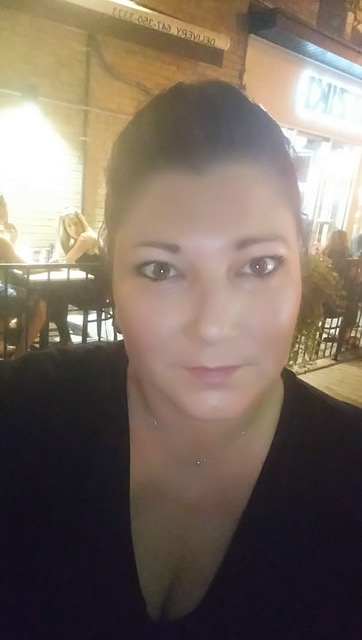
Posted by: The Sumaira Foundation in MOG, Voices of NMO
 It was the Friday before Halloween in 2018. Anthy was on her way home from work when she called her husband to see if she needed to pick up anything on the way home. She heard him crying, telling her that his mother, in Greece, had just been diagnosed with cancer. Instantly, she felt a pop in her head followed by a feeling her head was draining away. She stayed on the phone with him throughout the whole drive home, both to console him and because she was afraid of what had just happened to her.
It was the Friday before Halloween in 2018. Anthy was on her way home from work when she called her husband to see if she needed to pick up anything on the way home. She heard him crying, telling her that his mother, in Greece, had just been diagnosed with cancer. Instantly, she felt a pop in her head followed by a feeling her head was draining away. She stayed on the phone with him throughout the whole drive home, both to console him and because she was afraid of what had just happened to her.
She woke the next day with a headache that lasted for four days, with pain behind her eyes. Not one to EVER miss going big on Halloween or Christmas, that Wednesday, Anthy ignored her symptoms and started applying Halloween make-up. To her horror, she realized she couldn’t even see it. Her eyesight was dimming.
Anthy works in a regional hospital in Toronto, Canada. The day after Halloween, her coworkers sent her to the optometrist next door. Her headache was gone by then, but she did have pain when she moved her eyes. The optometrist tested her, found nothing, and sent her on her way. A few minutes later, the head of that office called Anthy back for more testing. Still, nothing.
The next day, her supervisor told Anthy that she didn’t look well, and insisted she go home. On the way, Anthy stopped at Walmart, and was surprised that no lights were on. She figured there had been a power outage, and shopped in the dark that no one else seemed to notice.
The day after that, Anthy awoke to excruciating pain in her pelvic region and inner thighs. She was screamingly sensitive to touch, even from clothes, and felt like that part of her body was on fire. Her husband took Anthy to a walk-in clinic where they diagnosed a yeast infection, and sent her off to buy cream. Though this didn’t seem right to Anthy, she purchased the medicine and gave it a try.
Two days later, Anthy’s legs slowly collapsed from under her. She grabbed a drawer to keep from falling hard, but ended up on the floor. Her husband was at work, where his presence was essential. She crawled to the phone to call a friend, crawled to the closet for clothes, and even crawled outside to the car, when her friend came to take her to the hospital where Anthy worked. The triage nurse in the ER said she’d never seen anything like this conglomeration of symptoms happening so fast. The team there was most concerned about her eyesight and sent Anthy back to the optometrist. He sent an urgent request to a neuro ophthalmologist, who was only able to see her in two weeks.
She returned to the emergency room of her hospital, where they scanned her bladder and found, well, a little something. Still, they were most concerned about her vision loss and tried to send her back to the optometrist. This time, Anthy refused. Her legs were essentially paralyzed and she was retaining urine. After a few more tests, the ER doctors sent Anthy home without any medications or follow-up appointments. She was on her own. Thank goodness, she says, she lives with such a supportive husband. Their families are all in Greece, so caring for her fell 100% on his shoulders.
By the time Anthy went to the neuro ophthalmologist, she was practically blind and unable to walk. She spent many hours in that office, getting tested and outlining her experience. At the five-hour mark, the physician told Anthy that he suspected a disease of which she’d never heard – NMO. He asked if she was willing to go to the hospital immediately. Without the overnight bag she’d brought for previous ER visits, Anthy said yes. The doctor sent Anthy to a research hospital downtown this time, rather than to the provincial hospital where she worked.
When Anthy called her husband from the hospital, he told her that his mother’s mastectomy was scheduled for that day as well. Trying to spare his feelings, Anthy downplayed her own situation. Anthy got a CAT scan, an MRI, a lumbar puncture and multiple blood tests. She was given an IV steroid drip (Solumedrol), followed by plasmapheresis (PLEX), and an oral steroid taper.
Anthy was sent home without any medication or physical therapy prescriptions, any home care, nor any instructions. No services were suggested to her, but for a single visit from a social worker who essentially had nothing to offer. For all intents and purposes, she was blind and paralyzed from her chest down. She was told an MS center would contact her, but she had to reach out to them. The earliest she could get an appointment was for six months later.
Anthy’s husband carried her to the couch each morning, and left for work. When he returned home, he carried her to the bathroom and fed her. From her couch, Anthy consulted Dr. Google and found she had five years left to live. Until she found the NMO Facebook pages and support groups, Anthy felt alone, confused and desperate. She now knows to look forward to a long life, and is enjoying all the symptom improvements she is experiencing over time, and interacting with other NMOSD patients around the world.
The doctors at the MS clinic started Anthy on Rituximab. After discussions with them, this medication seemed like the best and safest for her. Unfortunately, because Rituximab is off-label for MOG-AD, neither the national insurance nor her Ontario Health Insurance Plan covered her for the drug. Anthy is thankful that Roche is sponsoring her pharmaceutical care.
Over the months, her vision slowly improved to where it is today. OK but with daily bouts of blurriness, as if Vaseline was spread over her eyes. For a few seconds each day, she still sees double. She remains sensitive to light, and doesn’t leave the house without sunglasses. She always has trouble urinating. Additionally, she still has some moments of burning and electricity in her legs, skin sensitivity and tingling. Her feet remain numb. She walks a bit “like a drunk” and sometimes resorts to using a cane. Anthy’s thighs are so sensitive, still, to the touch, that she meditates in order to handle the shock of showers.
Like many with NMOSD, Anthy also suffers from another disorder – hers is diabetes. She keeps a diary of her symptoms in an attempt to find what affects her. She has found that both cold and humidity are culprits. In fact, she says, she walks into a supermarket in one way, and walks out another, due to the cold in the building. And yes, Anthy knows that she’s unusual in this reaction among NMOSD patients. “Bring on the heat!” she exclaims, laughing.

The corona virus pandemic has hit Anthy particularly hard. An anxious person anyway, she is now periodically subject to panic attacks. She is being as careful as possible, and is grateful for the understanding and support of her “amazing” husband.
Anthy is on long-term leave from her place of work. With the support of her doctor and her husband, Anthy has picked up an old hobby, and started painting again.
Anthy is grateful for her quick correct diagnosis and that she was given the right treatment for MOG-AD. She advises patients to learn as much as they can about their disorders, and to become their own advocates. She recalls a moment when she felt like an ice pick was hacking at her eyes. Her doctor said, “Sometimes when we (the doctors) don’t see anything and tell that to the patients, the pain just goes away.”
Anthy has experienced the Canadian health system at its best and its worst. She hopes that future patients will be better guided through their diagnoses and disease progression. She hopes others will get the help with forms, navigating to specialists, and attaining services for which she was left on her own. And Anthy, in telling her own story, both here and on Roche’s website (Taking on Life with a Rare Disorder), hopes that her journey can illuminate the paths that others will follow.
As told to Gabriela Romanow on November 20, 2020.